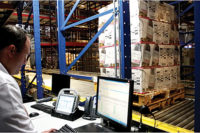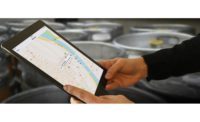ERP software helps snack producers and bakeries maximize efficiency, minimize paperwork

courtesy of SYSPRO USA

courtesy of QAD

courtesy of FlexiBake

courtesy of DEACOM ERP




Enterprise resource planning (ERP) software helps producers improve efficiency and day-to-day operations. New software can help snack and bakery companies increase their financial success, and there are a variety of ERP technologies from which to choose.
“To succeed in the baking and snack food industry, batch process manufacturers are required to consistently produce quality products at competitive prices and meet the demand of their customers while managing a healthy bottom line,” says Daniel Erickson, product strategy manager, ProcessPro, St. Cloud, MN. ProcessPro’s ERP solution is developed to “manage critical business functions—manufacturing, quality, inventory, financials, sales, and reporting—in one integrated system.”
FlexiBake, Vancouver, British Columbia, offers ERP software specifically designed for the baking industry. “FlexiBake has tools to help with the fast pace at which the bakery industry moves, including instantly generating hundreds of standing orders, an online ordering portal for client’s customers and an app that allows drivers to manage their routes while out on deliveries,” notes Nicole Ortner, marketing manager. “Production can be automatically calculated based on orders and stock levels, along with critical reports.”
SYSPRO USA, Costa Mesa, CA, provides an ERP solution that allows their customers to access the software on-site, in the cloud or from a mobile device. “SYSPRO USA provides food and beverage companies with 360 degree visibility in order to effectively manage areas like quality control, recipes, regulatory compliance, traceability, inventory management, purchasing, production, sales, financials and more,” says Joey Benadretti, president. The software monitors the food life cycle from initial ingredients purchases through final delivery.
Smaller and medium-sized bakeries and snack producers can benefit from the ERP software offers by Wherefour, Petaluma, CA. “Because these companies frequently have variable sales and a different set of daily production needs, our software drives production through the use of work orders,” explains Matt Brown, founder and CEO. “Work orders can be built from any type of source—from recipes or formulas, to specific customer orders.”
Wherefour’s “what if” production forecasting module helps businesses determine if they can produce specific multiples of their recipes with the inventory they have on hand, says Brown, or if additional purchases will be required.
QAD, Santa Barbara, CA, offers a variety of product offerings centered on a complete ERP solution. QAD’s solution can provide full product traceability, synchronized production with item-level forecasting, ability to quickly change production schedules, and improved demand planning and supply-chain management. “In the snack food and bakery markets, consumers want healthier, safe products, and they want them quickly,” says Stephen Dombroski, senior marketing manager, consumer, food and beverage markets. “New products are constantly being added, and complying with quality and safety regulations requires constant attention.”
DEACOM ERP, Chesterbrook, PA, helps food manufacturers achieve process control by providing a large functional foundation directly within its comprehensive software solution, says Scott Deakins, COO. “Deacom’s ERP platform encompasses all critical manufacturing needs, including quality-control features, enabling the companies to efficiency ensure high-quality products. With a centralized set of business logic, the software is able to easily scale with businesses as industry needs and regulations evolve.”
Key features
Primary features of ProcessPro’s software include point of sale (POS), direct store delivery (DSD) and a warehouse management system (WMS). “The critical needs of baked good and snack food manufacturers, including private label and co-packers, are met with ProcessPro’s comprehensive, industry-specific ERP solution, offering product development, management of complex formulas and recipes, full lot traceability, quality control, costing, and compliance,” says Erickson.
The DSD function mobilizes route sales and delivery teams for order entry, invoicing and payment transactions on the road. WMS increases efficiency and improves data accuracy for receipts, movements, transfers, issues and returns, pallet tracking, and sales order shipment, while also providing real-time inventory transactions through barcode scanning.
ProcessPro has over 30 years of experience in the baking and snack industry, and it knows that “tracking and tracing of inventory accurately is key in the ability to manufacture.” Common challenges addressed by its customers who utilize the software include the ability to track lot numbers for raw materials and finished goods, mock recall capability and completely of audit trails that comply with the FDA and cGMP requirements.
At FlexiBake, its ERP software has traceability options, sales management features, an online ordering portal, a DSD app, and detailed production processes, among other features, says Ortner. “Its business intelligence tools such as ‘what if’ analysis, bulk pricing and price tier management, sales and costing reports, and production yield comparisons give organizations insight that until now was only available to highly sophisticated bakeries.” The online ordering portal gives users the ability to create their own, personalized ordering portal.
“In terms of business functions, FlexiBake handles business intelligence and analysis on costing, production, sales and forecasting. We can replace an inventory management system, a warehouse management system, production software or spreadsheets, nutritional analysis services or software, labeling software, and control purchasing processes,” says Ortner.
Some key capabilities provided by QAD’s ERP solutions include financials, demand and supply-chain planning, serialization and lot trace workbench, planning and scheduling workbenches, and trade activity management.
DEACOM ERP helps companies manage their entire operations throughout a product’s lifecycle. From the moment a new order is placed to when it gets shipped out the door, the ERP software tracks, manages and documents all movement and changes surrounding that product, explains Deakins. “In the food industry, the management of food recalls is one of the most-critical business challenges,” he continues. “Critical factors of the lot-tracking process, from identifying each raw material and where it came from through its destination, can be accessed and leveraged by every department in real time.”
SYSPRO USA’s solution includes capabilities to manage inventory levels to optimize competing demands of availability versus cost and calculate lead and elapsed times, as well as managing material, labor and scrap during work-in-progress.
Wherefour’s ERP systems are “designed to integrate, and automate, business systems, from order placement through invoicing,” explains Brown. “Our software platform provides a ‘virtual workspace’ for food producers, where each member of the team can fulfill his/her role in producing, tracking and shipping products.” One of the advantages of the system is that all records are in one place and easy to access.
Wherefour’s platform also integrates with other popular systems, such as Quickbooks, so that companies can sync their customer and vendor records, as well as generative invoices and purchase orders and send them to Quickbooks. New integrations with platforms like Shopify, ShipStation and Amazon were released at the end of 2017.
Wherefour’s software is also tracking-conscious, and tracks the “exact cost of everything used in production, and generates a report of cost of goods sold,” says Brown. “Lot codes used for each batch are a button-click away.” All inventory is tracked and lot-coded, too, and can be easily adjusted as needed to keep virtual data in sync with physical stocks.
Looking for a reprint of this article?
From high-res PDFs to custom plaques, order your copy today!












